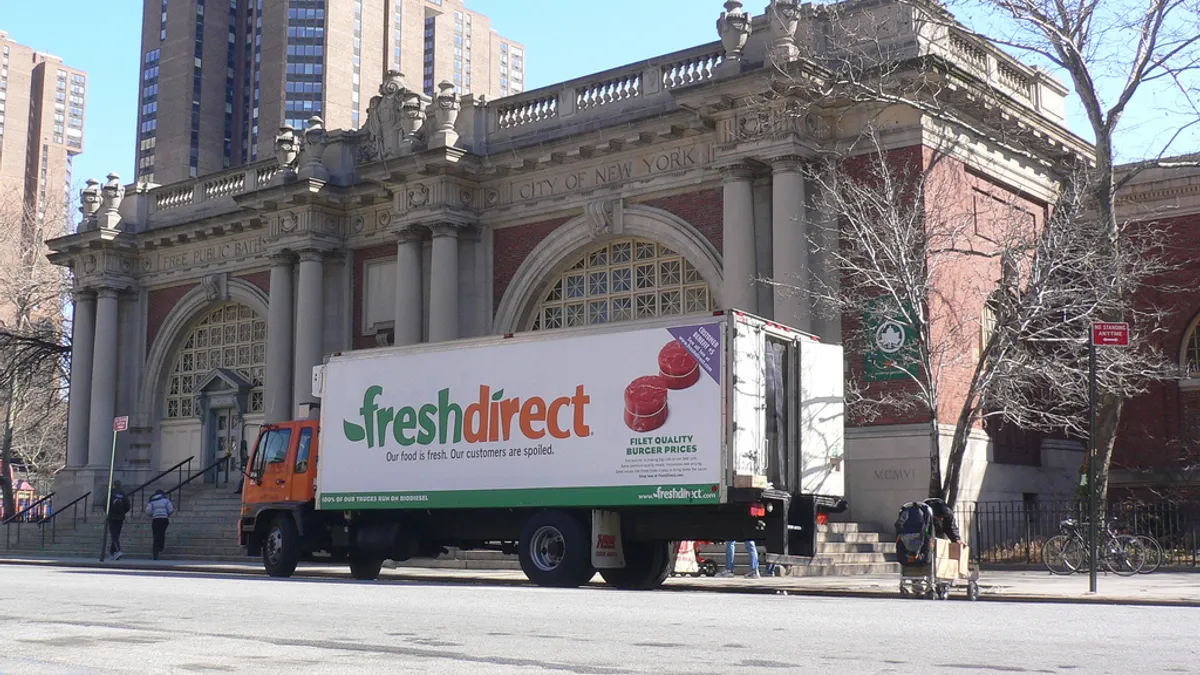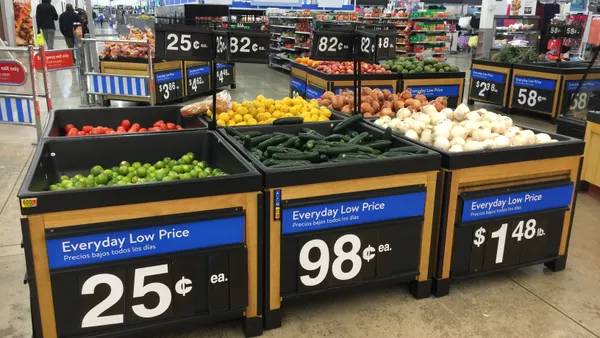Dive Brief:
- FreshDirect and technology firm Fabric will open a micro-fulfillment center (MFC) at one of the grocer’s Washington, D.C.-area distribution facilities later this year that will expand service and launch same-day service in the city, the companies announced Tuesday.
- The 10,000-square-foot MFC, which is run by Fabric, will handle around 10,000 fast-moving SKUs and can process up to 1,000 orders per day, according to Steve Hornyak, Fabric’s chief commercial officer. Product will come in daily from FreshDirect’s automated warehouse in the Bronx, New York. Hornyak said the MFC and on-demand service was originally slated to go live late this summer but has been pushed back to late 2020 due to shifting priorities during the pandemic.
- FreshDirect indicated in its announcement that it plans to utilize micro-fulfillment technology in additional facilities. “Fabric’s technology will allow us to turn our existing regional facilities into high-velocity automated distribution centers, speeding our expansion into new markets with 2-hour on-demand delivery,” FreshDirect CEO David McInerney said in a statement.
Dive Insight:
FreshDirect, a company that’s made most of its money off next-day delivery, is moving decisively toward same-day service as demand and competition for online groceries increases. And it sees micro-fulfillment as a key tool in that journey.
The online grocer relaunched same-day delivery in New York City last month, rebranding it as FreshDirect Express. The Washington, D.C. on-demand service is the first the grocer has touted utilizing an MFC, and judging by the announcement it won’t be the last.
“FreshDirect believes this relationship will serve as a blueprint for future service upgrades as they eye other parts of the country,” the e-grocer noted. “To that end, this first foray into the automated micro-fulfillment space will drive critical efficiencies, enabling faster service and a substantial increase in order volume capacity.”
Hornyak confirmed that Fabric and FreshDirect are exploring adding micro-fulfillment technology to other facilities. Asked if Fabric was powering fulfillment for its Express service in New York, Hornyak said, “Not yet.” He said the D.C.-metro area could support up to four MFCs under a single brand.
“We didn’t do this just to do one site with FreshDirect,” Hornyak said.
Hornyak said FreshDirect is looking to build out same-day delivery services throughout the Northeast Corridor. The online grocer expanded next-day service to Washington, D.C., in 2017 and last year expanded service to suburbs in Virginia and Maryland. In addition to New York and Washington, D.C., the company also services parts of Connecticut, Delaware, New Jersey and Pennsylvania.
A FreshDirect representative was not available for an interview before publication.
The D.C.-area MFC will handle anywhere from a couple hundred orders up to a thousand daily. Fabric’s system utilizes shuttle robots and an automated shelving system to store and pick products. The robots bring product containers to human assembly workers, who arrange orders and merge any items picked from outside the robotic system, like cases of bottled water, fresh produce or packs of toilet paper. FreshDirect will also have a made-to-order facility on site to handle prepared deli items, meat, fish and other fresh products to “top off” orders, Hornyak said. Fabric workers will operate the micro-fulfillment center while FreshDirect workers will handle inbound and outbound logistics as well as made-to-order items.
This is the first announced U.S. retail partnership for Fabric, formerly known as CommonSense Robotics, which is based in New York and started five years ago in Tel Aviv, Israel, where it erected its first test MFC. And it’s the first micro-fulfillment announcement since the pandemic hit the U.S. in force nearly five months ago. Industry experts have touted the necessity of automation to make online order fulfillment faster and more efficient — a message that’s been ringing in grocers’ ears since the virus surge flooded online ordering systems, causing initial wait times of up to three weeks for some services.
With its small, flexible facilities, micro-fulfillment promises to bring automated fulfillment to the local level. Some grocers are placing MFCs in the backs of their stores while others are piloting standalone facilities. Albertsons, which currently operates two MFCs in California, plans to explore both options, CEO Vivek Sankaran said during the company’s earnings call Monday. And Hornyak said another Fabric customer, which he declined to name, is testing out both modes.
But MFCs are not able to scale fast enough to meet surging online demand given timelines for construction, development and retail pilots, Hornyak admitted. He characterized the demand Fabric has been seeing from retailers as “violent, but in a good way,” and said numerous retailers have asked to speed up implementation.
Hornyak said he expects retailers to work with multiple micro-fulfillment providers, which also includes Dematic, Takeoff Technologies and Alert Innovation.
“The alternative is that [retailers are] going to limp along and continue to hand the keys of their business to Instacart, Shipt and others that use their stores as a warehouse,” he said.
To get facilities up and running faster, Fabric is exploring ways to outsource the construction, operation and service of its MFCs to other companies, leaving the firm to focus on software and hardware development.
Hornyak said Fabric expects to have 10 MFCs running by the end of this year and between 50 and 100 by the end of next year. Within five years, he anticipates the company will be running as many as 1,000 MFCs.













